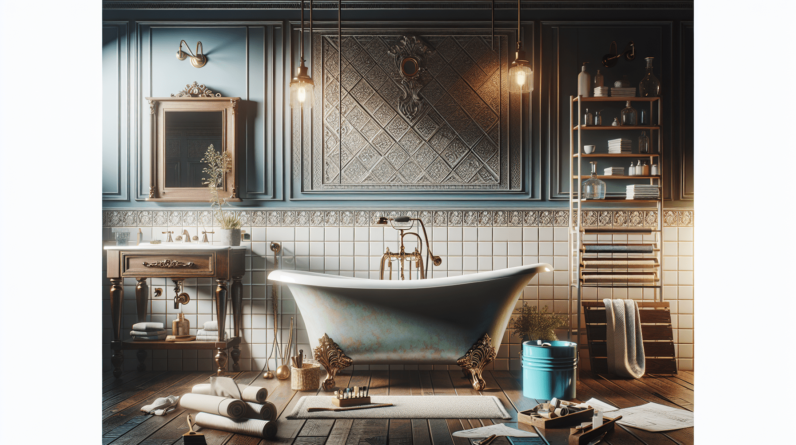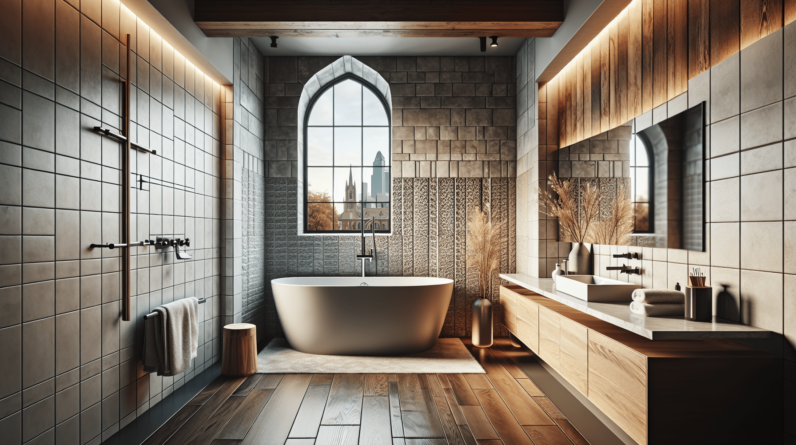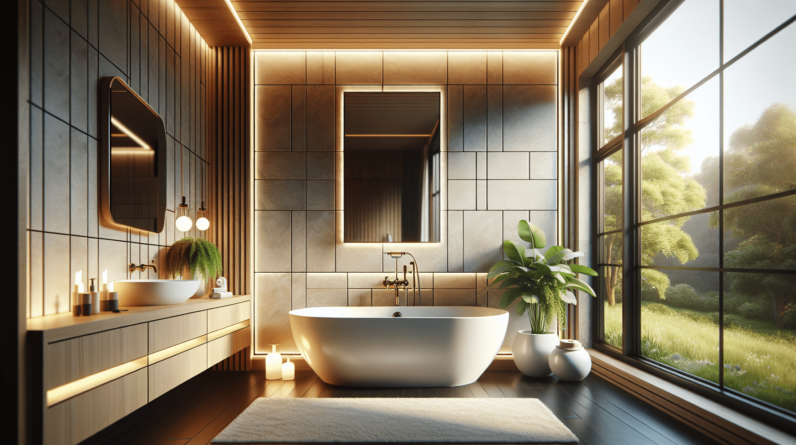
Have you ever thought about transforming your bathroom into a sanctuary? Remodeling your bathroom yourself can seem daunting, but with the right approach, it can also be incredibly rewarding. Not only will you save money, but you will also personalize your space in a way that reflects your style.
Planning Your Bathroom Remodel
Before picking up a hammer or a paintbrush, it’s essential to have a solid plan in place. You wouldn’t want to rush into this important project.
Set a Budget
Start by determining how much you are willing to spend. This will guide you in your decisions and help manage your expectations. Think about all aspects of the remodel, including materials, tools, and fixtures. Don’t forget to include a little wiggle room for unexpected expenses, as they often pop up when you least expect them.
Define Your Goals
What do you want to achieve with your remodel? Are you looking to make your bathroom more functional, modernize an outdated space, or create a spa-like atmosphere? Write down your goals, and prioritize them. This list will be your blueprint throughout the renovation.
Measure Your Space
Accurate measurements are crucial. Use a measuring tape to record the dimensions of your bathroom, noting the positions of electrical outlets, plumbing, and windows. This will come in handy when you pick out materials and fixtures.
Choosing the Right Design
A well-thought-out design can make a world of difference. It won’t just affect the aesthetics but also the functionality of the space.
Consider Your Style
Decide early on what style appeals to you. Are you leaning toward modern, rustic, or perhaps something more classic? Gathering inspiration from magazines, websites, or social media platforms can help you visualize your dream bathroom.
Create a Layout
You may choose to modify the layout of your bathroom or stick with the current one. Creating a floor plan can help visualize where everything will go. Ensure that you allow enough space for movement, and consider your daily routine and how you use the space.

Demolition: The First Step in Your Remodel
Once you have your plan in place, it’s time to get to work. Demolition may feel intimidating, but it’s an essential part of the remodeling process.
Gathering Tools and Supplies
Make sure you have the right tools for the demolition phase. Some essentials you might need include:
| Tool | Purpose |
|---|---|
| Hammer | For tearing down fixtures |
| Pry Bar | To remove tiles or plaster |
| Safety Gear | Protect your eyes and hands |
| Utility Knife | Cut through caulk and drywall |
Safety First
Always prioritize safety. Wear gloves and goggles, and make sure the area is well-ventilated. It’s also wise to turn off the water supply and electricity before starting.
Remove Old Fixtures
Begin by stripping away anything that you plan to replace—vanities, mirrors, tiles, or flooring. Take care not to damage any plumbing or electrical work that you plan to keep.
Plumbing and Electrical Considerations
If your remodel involves moving plumbing or electrical components, this section is vital.
Assessing Your Plumbing Needs
Are you keeping the existing fixtures in their current locations or relocating them? If you’re changing the layout, you’ll need to plan for new plumbing lines or drainage systems. Depending on your skill level, this might be a good time to hire a professional for complex tasks.
Updating Electrical Fixtures
Check if your lighting and outlets meet current codes and your needs. You may want brighter lighting, additional outlets, or even a heated floor system. While some electrical work can be DIY, consider hiring someone for major changes.

Flooring Options
Choosing the right flooring can significantly impact the look and feel of your bathroom.
Types of Flooring
You’ll want to consider various flooring materials and their suitability for a high-moisture environment. Here are some popular choices:
| Flooring Type | Pros | Cons |
|---|---|---|
| Tile | Durable and water-resistant | Can be cold and hard underfoot |
| Vinyl | Affordable and water-resistant | May not be as stylish |
| Laminate | Easy to install and maintain | Not as moisture-resistant |
| Hardwood | Warm and classic appeal | Can warp in moisture |
Installation Tips
Once you’ve chosen your flooring, follow the manufacturer’s guidelines for installation. Ensure the subfloor is in good condition to give your flooring a solid foundation.
Wall Treatments
After the flooring comes the walls, and you have various ways to spruce them up.
Painting vs. Tiling
You can either paint the walls or opt for tiles. If you choose to paint, use moisture-resistant paint designed for bathrooms to avoid mold growth. For tiling, ceramic or porcelain tiles work well in wet areas.
Adding Accent Walls
Consider adding an accent wall to create a focal point. A vibrant color or a unique tile pattern can make your bathroom pop.
Installing Fixtures
Now comes the exciting part—adding new fixtures!
Selecting Fixtures
When it comes to faucets, sinks, and toilets, the options are endless. Take your time choosing fixtures that harmonize well with your overall design and follow your budget.
Installation Process
If you’re confident in your DIY skills, installing fixtures can be straightforward. Most manufacturers provide installation guides that can be quite helpful. Having a buddy can ease the process too!
Lighting Your Bathroom
Lighting plays a crucial role in bathroom ambiance and functionality.
Layer Your Lighting
You may want to incorporate multiple sources of lighting. Consider ambient lighting, task lighting, and accent lighting. A combination will create a warm and inviting atmosphere.
Choosing Light Fixtures
Select fixtures that match your style and provide sufficient illumination. Overhead lights combined with sconces around the mirror can provide great functional lighting.
Final Touches: Accessories & Decor
After the heavy lifting is done, it’s time to make your bathroom truly yours.
Choose Accessories
Add accessories like towels, shower curtains, and rugs that coordinate with your color scheme. Thoughtfully selected accessories can enhance the overall design.
Personalize Your Space
Don’t forget the decorative elements! Plants, artwork, or stylish storage solutions can add character to your bathroom.
Maintaining Your Newly Remodeled Bathroom
After putting in all that effort, you’ll want to maintain your new space to keep it looking fresh.
Regular Cleaning
Establish a cleaning routine that works for you. Regular care can prevent mold growth, maintain the shine of fixtures, and prolong the life of your flooring.
Keeping an Eye on Moisture
Be sure to regularly check for signs of moisture damage. Look for peeling paint, discoloration, or musty odors. Address any issues right away to avoid causing bigger problems down the line.
Conclusion: Enjoying Your Bathroom Transformation
You’ve made it through the entire remodeling process, and the result is a bathroom tailored just for you. Nothing beats the satisfaction of enjoying a space you’ve created with your own hands. Remember to take pride in your work and enjoy every moment in your new bathroom sanctuary!








